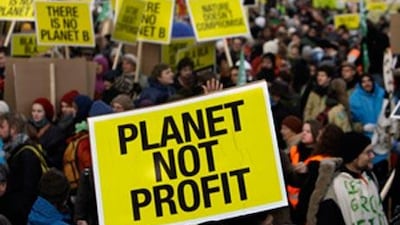They sang each other's praises in the run-up to the climate summit, but China and the US traded barbs in a superpower standoff that has helped set the UN talks on edge. The world's two largest carbon polluters were at loggerheads on key issues such as how to divide the burden of cutting greenhouse gases, whether such efforts should be independently verified, and whether the US owes developing countries, including China, a "climate debt".
"The atmosphere seems extremely negative," said Isabel Hilton, the editor of the online environmental newsletter China Dialogue. "Everyone is taking tough positions, talking to their domestic audiences. "It's a big change of tone. Before coming, China made positive noises, even suggesting they were ready to announce a date at which their carbon emissions would peak. "But here they have been hanging very tough."
Late last month, China vowed to nearly halve the carbon intensity of its economy over the next decade. At the conference, however, Beijing seems to have dug in its heels, insisting on its status as a developing country, no less a victim of the West's legacy of carbon-polluting industrialisation than the poorest of African nations. "The priority for the developing countries is still the reduction of poverty, is still economic development," said He Yafei, the Chinese vice minister of foreign affairs.
The US acknowledges the historical responsibility of rich nations for global warming. At the same time, Washington has pushed China and other emerging giants to take on more ambitious targets. "The US is not going to do a deal without major developing countries stepping up," said Todd Stern, the US chief negotiator, pointing out that developing countries are projected to account for 97 per cent of global emissions within four decades.
"If we are talking about the need to keep the temperature increase below 2°C, you can't even have that discussion if the major developing countries are not taking a major role," he said. China has ridiculed the US offer to cut its carbon dioxide output by 17 per cent from a 2005 benchmark. Part of the standoff is negotiating bluster, said Jennifer Haverkamp, the managing director for international policy and negotiations at the Environmental Defence Fund, based in Washington.
"These negotiators have not only their ministers coming, but their uber-bosses, heads of state, showing up in a few days, so the pressure is enormous to reach a deal," she said. "If sharp words get into the public conversation, that is a reflection of the fact that stakes are high." But it also reflects, analysts say, a genuine gap on key issues. Two of the most contentious are finance and international monitoring.
Mr He said he was "shocked" that Mr Stern had two days earlier rejected the notion that developing countries were owed a "debt" or "reparations". "We are not asking for donations. Industrialised countries have a legal obligation, the US included. Whoever created the problem is responsible," Mr He said. Beijing has also objected to the US insistence that even if developing country efforts to stem global warming remain voluntary, they should be independently measured, registered and verified - "MRVed" in climate change lingo.
"It doesn't mean China will not do what it promises," said Mr He, asserting that China's own legal guarantees and verification procedures were adequate. "But there is no MRV internationally because it is a matter of principle." At pains to burnish its status as a "developing country", China has also come under pressure from poorer nations that see their interests diverging from those of the Asian giant, with which they have been long been aligned in the Group of 77.
* Agence France- Presse

